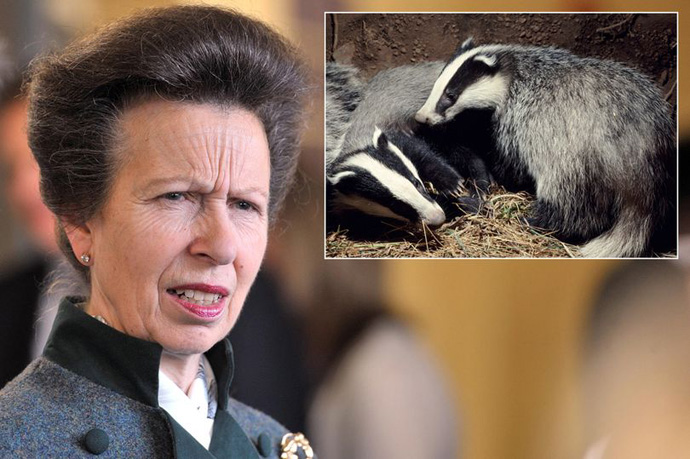DAILY MIRROR
4 April 2014 by Martin Bagot
Animal welfare campaigners blasted her support for the cull and experts said gassing – which has been outlawed for 30 years – resulted in a slow death

Princess Anne sparked a furious backlash after she called for badgers to be gassed. The princess said gassing was more humane than shooting because badgers “go to sleep basically”. But animal welfare campaigners blasted her support for the cull. And experts said gassing – which has been outlawed for 30 years – resulted in a slow death. The Princess Royal said that people who had culled badgers “will tell you that gas is a much nicer way of doing it, if that’s not a silly expression. Because of the way it works. And how it works is that you go to sleep basically.”
The Zoological Society of London has branded the gassing of badgers “inhumane”.
And Green Party animals spokeswoman Caroline Allen, a vet, said: “Research shows that gassing badgers is more inhumane than shooting.”
Mark Jones, executive director of the Humane Society International UK, said: “It is extremely disappointing that a prominent member of the royal family should endorse the gassing of a supposedly protected indigenous wild mammal. “Gassing experiments carried out at Porton Down in the early 1980s were abandoned because of the appalling levels of suffering to which the badgers were exposed.”
The Royal intervention comes after Environment Secretary Owen Paterson announced the cull in Somerset and Gloucestershire would continue.
PA Badger – Environment Secretary Caroline Spelman will today announce further plans to tackle bovine TB in badgers Badger: The cull aims to tackle bovine TB
But the controversial pilot scheme will not be rolled out to other areas because it failed to kill enough badgers.
In an interview for the BBC’s Countryfile to be aired on Sunday, Princess Anne defended the badger cull as a necessary conservation measure. “If there are a lot of badgers you’re going to have no hedgehogs, probably no wild bees and fewer ground nesting birds,” she said. “From a conservation issue alone you’d have to say here are too many badgers.” The badger cull is intended to reduce the spread of bovine TB in cattle. But an independent report found the level of culling needed could not be achieved by shooting. Dr Rosie Woodroffe, from the Zoological Society of London, said: “It’s tempting to think it might be easier to kill badgers when they’re basically a sitting target underground. But it turns out from reports done in the 1970s that it’s just not that straightforward.” In the interview – conducted at Gatcombe Park, her private country home in Gloucestershire – the Princess Royal also repeated calls for horse meat to be sold in the UK . Commenting on estimates of thousands of unwanted horses in the UK, she said: “I do think an awful lot of the abandonments are because they don’t perceive there to be any value in the animals. But the meat trade adds value to the animal, so there is some point in keeping it healthy if it’s got an end point that it can go to.”
Asked about her views on GM crops, Anne said: “I think it has a role to play, to be honest. I think the claims are probably slightly greater than most of the deliverables actually are. They do add to our ability to perhaps be more efficient users of the land. That is good, because I think in the long term, when you’ve got the prospect of nine billion to feed, you are going to need some help in doing that and to do it well. She admitted she “seldom” discusses the subject with Charles, who once suggested the method risked creating “the biggest disaster environmentally of all time”.
Anne said opponents to GM crops should accept that genetic engineering is inevitable. She told the programme: “I do think there are some things which, even if you don’t like the sound of it yourself, you know that it’s got to a point where you’re not going to stop it, because you can’t. “So, you really must focus on how you can get the best out of it so it works for humans and the globe in the long run.”